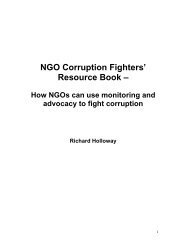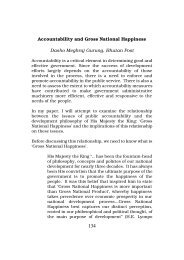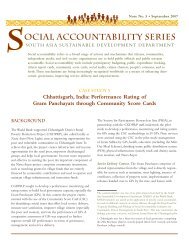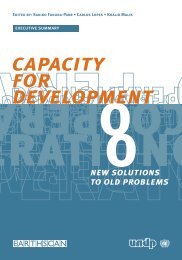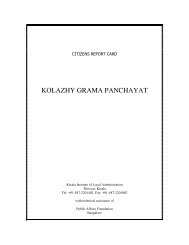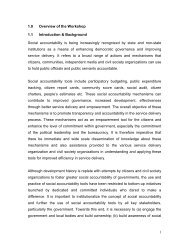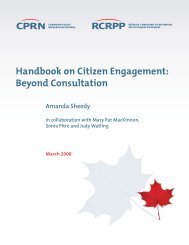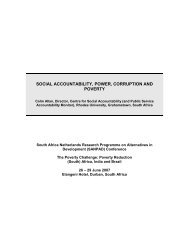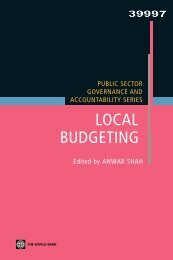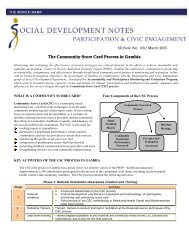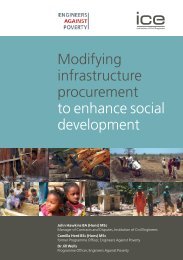Enabling Environment for Social Accountability in ... - SASANet
Enabling Environment for Social Accountability in ... - SASANet
Enabling Environment for Social Accountability in ... - SASANet
Create successful ePaper yourself
Turn your PDF publications into a flip-book with our unique Google optimized e-Paper software.
Nevertheless, while more than 40 percent of the respondents <strong>in</strong>dicated that opportunities to <strong>in</strong>fluence<br />
public policy and legislation by negotiat<strong>in</strong>g with public officials were at least somewhat sufficient, nearly<br />
a third stated that they are <strong>in</strong>sufficient. Another 14 percent went so far as to declare that there were no<br />
opportunities <strong>for</strong> negotiation, undoubtedly reflect<strong>in</strong>g their own <strong>in</strong>ability to negotiate with public officials<br />
(see figure 3.4.2).<br />
Figure 3.4.2 Ability of CSOs to Negotiate with Public Officials<br />
Don't Know,<br />
2%<br />
Miss<strong>in</strong>g, 10%<br />
Sufficient,<br />
7%<br />
No<br />
Opportunity,<br />
14%<br />
Somewhat,<br />
35%<br />
Insufficient,<br />
31%<br />
Source: CSO Survey (Annex 6, Question N).<br />
One might assume <strong>in</strong>tuitively that negotiation between citizens and public officials at the local level<br />
would be greater, due to the greater accessibility of local officials and their more direct accountability to<br />
local constituents. Indeed, this is the underly<strong>in</strong>g assumption of decentralization <strong>in</strong>itiatives among<br />
<strong>in</strong>ternational development agencies and donors. In fact, respondents to the CSO Survey found local<br />
officials to be only slightly more receptive to their social accountability-related activities than were<br />
national officials, with 48 percent of respondents <strong>in</strong>dicat<strong>in</strong>g that local officials are at least somewhat<br />
receptive to social accountability <strong>in</strong>itiatives by CSOs, as opposed to 45 percent <strong>for</strong> national officials<br />
(annex 6, Question K). There is, however, a great deal of potential <strong>for</strong> local-level social accountability<br />
<strong>in</strong>itiatives, <strong>in</strong>clud<strong>in</strong>g the use of Community Scorecards (CSCs) <strong>in</strong> the World Bank-sponsored Susta<strong>in</strong>able<br />
Livelihoods Project (SLP) (F<strong>in</strong>d<strong>in</strong>g 3.4.1). Donors, governments, CSOs, and service delivery agencies all<br />
over the world are <strong>in</strong>creas<strong>in</strong>gly us<strong>in</strong>g community scorecards and citizen report cards <strong>for</strong> stakeholders to<br />
evaluate the quality of services and negotiate desired changes. In Mongolia, however, the CSCs will<br />
become an effective mechanism <strong>for</strong> negotiation only if there is greater GoM ownership and closer CSO<br />
<strong>in</strong>volvement (see box 3.4.1).



